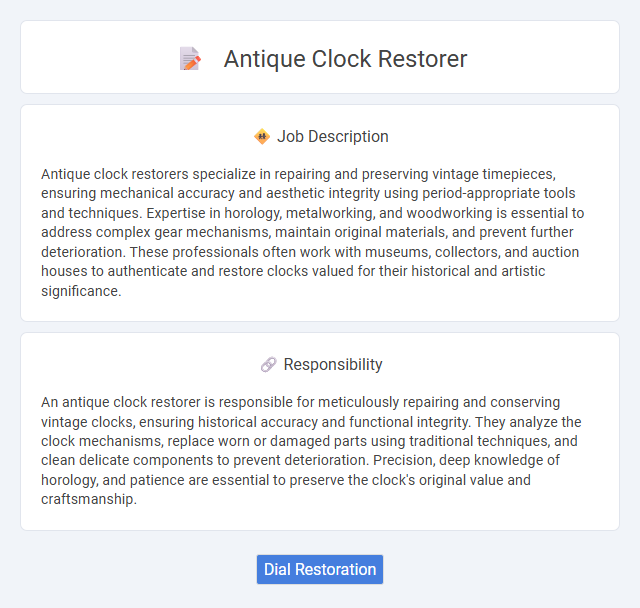
Antique clock restorers specialize in repairing and preserving vintage timepieces, ensuring mechanical accuracy and aesthetic integrity using period-appropriate tools and techniques. Expertise in horology, metalworking, and woodworking is essential to address complex gear mechanisms, maintain original materials, and prevent further deterioration. These professionals often work with museums, collectors, and auction houses to authenticate and restore clocks valued for their historical and artistic significance.
People who have a strong attention to detail and patience are likely to be well-suited for a job as an antique clock restorer. Individuals with steady hands and a passion for history or craftsmanship might find this work particularly rewarding. Those who prefer fast-paced environments or dislike meticulous tasks may struggle with the demands of this profession.
Qualification
Expertise in horology and deep understanding of mechanical clock mechanisms are essential qualifications for an antique clock restorer. Proficiency in precision tools, metalworking, and knowledge of historical clock styles enhances restoration accuracy and preservation. Certification from recognized horological institutions or apprenticeships under master restorers significantly improve job prospects and credibility.
Responsibility
An antique clock restorer is responsible for meticulously repairing and conserving vintage clocks, ensuring historical accuracy and functional integrity. They analyze the clock mechanisms, replace worn or damaged parts using traditional techniques, and clean delicate components to prevent deterioration. Precision, deep knowledge of horology, and patience are essential to preserve the clock's original value and craftsmanship.
Benefit
Restoring antique clocks likely enhances the preservation of historical craftsmanship and artistry, providing a meaningful connection to the past. This job probably offers the satisfaction of reviving unique, intricate timepieces that hold both sentimental and monetary value. Engaging in clock restoration may also develop specialized skills and open opportunities within niche markets of collectors and museums.
Challenge
Restoring antique clocks likely involves intricate challenges related to preserving delicate mechanisms while maintaining historical authenticity. The probability of encountering worn or missing parts that require custom fabrication or sourcing is high. Success in this job depends largely on meticulous attention to detail and a deep understanding of both horology and conservation techniques.
Career Advancement
Antique clock restorers with advanced skills in horological mechanisms and historical timepiece preservation often progress to senior restorer positions or curatorship roles in museums. Mastery of restoration techniques and expertise in rare clock identification enable career growth into consultancy or specialized conservation projects. Continuous education in clockmaking history and material science supports advancement to leadership roles within restoration studios or heritage organizations.
Key Terms
Dial Restoration
Antique clock restorers specializing in dial restoration meticulously repair and conserve fragile enamel, porcelain, and metal clock faces to preserve historical accuracy and enhance legibility. They employ precise techniques such as hand-painting numerals, filling paint loss, and stabilizing surface cracks, ensuring the dial maintains its original character and value. Mastery in identifying period-specific styles and materials is crucial to deliver authentic and high-quality restoration results.
 kuljobs.com
kuljobs.com